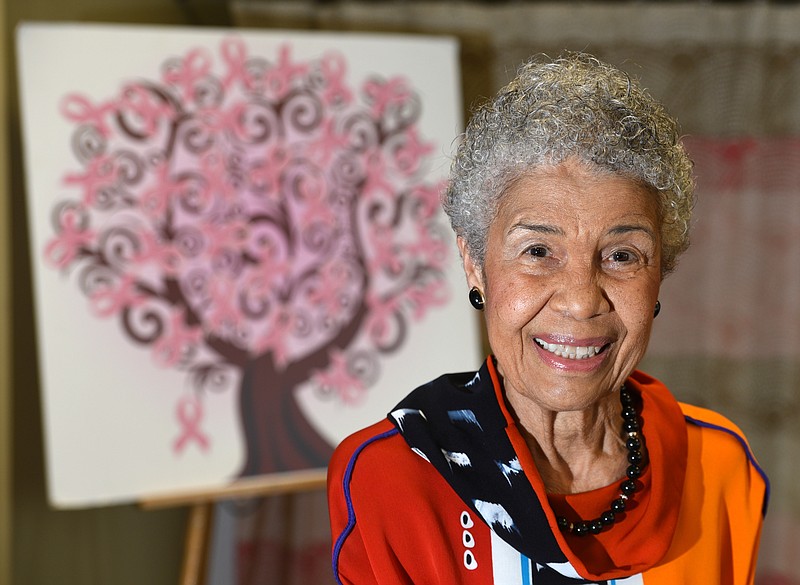If you go
What: Bra-Vo!When: 2 p.m. Sunday, April 2Where: Track 29, 1400 Market St. inside the Chattanooga Choo ChooTickets: From $40 per person up to $400 for 10.Information:http://www.bcss-chattanooga.org/bra-vo-.html or 423-629-2445.
Services
* Emergency Fund — Provides financial assistance to low-income families during treatment for breast cancer.* Support Groups — 6-7 p.m. second Monday each month at BCSS office, 1400 McCallie Ave.* Mastectomy Bra and Prosthesis Bank — Items are free to women in need. May also include wigs.* Educational Series — Quarterly dinner programs with information about the breast cancer.* Moving On — Annual health and fitness workshop in June.
Early in January 1989, Elaine Hill was told she had breast cancer. A couple of weeks later, she had surgery to remove the breast. On Jan. 23, she turned 52.
Happy birthday.
"The doctor wouldn't tell me what was going on until after the Christmas holidays," she recalls.
Still reeling from the emotional toll of January's string of events, Hill went back for her post-surgical exam only to learn that she had cancer in the other breast. It was removed in May.
By that point she was anxiously searching for some kind of support. While her husband, James, was "very supportive," she says, going to doctor's appointments, staying at the hospital, doing all the things a loving husband does, she needed another woman who had gone through what she was going through, who could put a metaphorical arm around her, offering solace and information.
She couldn't find it.
"It was a very difficult time for me and there was no emotional support available for me in town," says Hill, now 80. "I decided that, when I made it through that crisis, to reach back and help the next woman who was in my shoes."
Her decision led to Breast Cancer Support Services, which celebrates its 25th birthday in May. Among its offerings, the BCSS has support groups for women in the midst of breast cancer and those who've gone through the disease's ringer, giving them a place to discuss their fears and hopes. The organization has quarterly education classes on subjects such as proper diet, stress relief and exercise, and it partners with local stores to provide mastectomy bras and prostheses and wigs, which may not be covered by insurance.
In general, Hill says, the women "want help with medical assistance and they want to hear from other women who have had breast cancer. They want the emotional support for the anguish in what they're living through."
But some also need money, and one of BCSS' unique jobs is to provide financial support for women who need it. Many cancer patients cannot work while undergoing chemotherapy or radiation or are recovering from surgery and through its Emergency Fund, Breast Cancer Support Services helps pay rent or utilities and provides vouchers for those who need food for their family or gas for their cars.
"It's a way to meet the needs of a lot of survivors," says BCSS Executive Director Meghan Greene, 34, a breast cancer survivor herself.
The organization receives no state or federal money, she says, so donations for its operation come from individuals, corporations including Unum and foundations such as the Susan G. Komen and Benwood, among others. It also gets about 30 percent of its annual funding from Bra-Vo!, its fundraiser and fashion show set for April 2, she says.
For the organization, "everyone is a survivor from the day of diagnosis onward," Greene says, but to receive the financial help, a woman must be in active treatment for breast cancer. BCSS has an average of about a dozen women who apply every month for some kind of assistance, she says.
Although she went through her breast cancer trials in 1989, it took a few years for Hill to actually get BCSS off the ground.
"It took a while to heal and get over my diagnosis before I could reach out to new women," she says.
But once she did, she ran into a wall.
"I didn't know anyone and [breast cancer] wasn't really talked about then," she recalls. Women who hadn't suffered from cancer weren't interested, she recalls, because they didn't want people to think they'd had the disease.
So Hill turned to her friend Martha Lee, who wasn't a breast cancer survivor but was willing to help get some traction on the support group plan.
"I was having trouble getting breast cancer survivors to relate to me, to get the thing going," Hill says. "I went to Martha and said, 'I'm going to have to give this up if I can't get people to respond.' She put her arm around me and said, 'Elaine, I'll help you.'"
Lee helped "rally" women - cancer survivors and those who'd never had it - to get together and create the beginnings of BCSS, Hill says. The nonprofit officially opened in 1992.
Greene was 30 when she was diagnosed and she turned to the services of BCSS.
"I felt like I was underwater when I first was told," she says. "I think I knew that something was wrong, I just didn't know what to do."
While undergoing treatment, she attended some of BCSS' educational seminars, Greene says.
"They were very useful for me, stuff like how to deal with stress, how to eat right for the long-term."
For Hill, survival meant staying alive for her husband and her two sons and, especially, seeing her only grandchild - at the time - grow up.
"I can remember one of my first thoughts was: 'Just let me live until he graduates from high school.'"
She lasted longer than that. He's now a graduate of Yale Law School.
Contact Shawn Ryan or sryan@timesfreepress.com or 423-757-6327.
